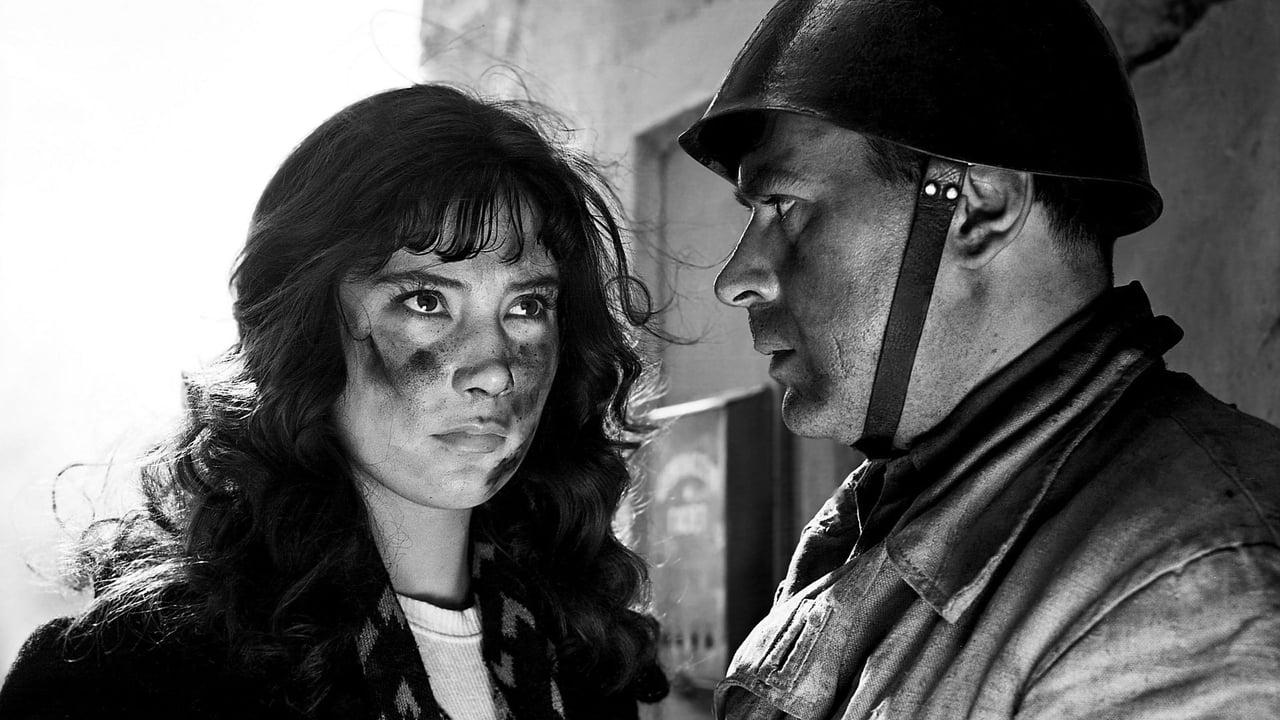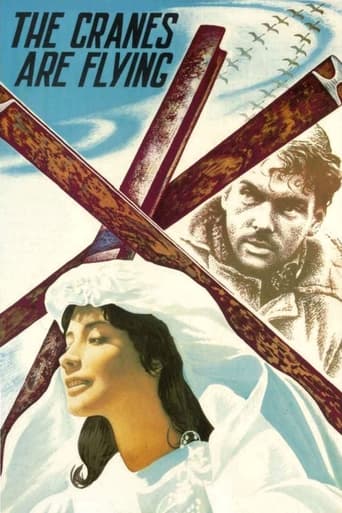Vonia
The Cranes Are Flying (Russian: Letyat zhuravli) (1957) Kind Veronika, Nicknamed "Squirrel" by her Boris, Before he departs, Gives her a stuffed squirrel and note. His last tragic love letter. Innocent young love, Cut short by the heartless war. Betrayal, rape, shame. Creative camera work Conveys war's calamity. (Tanka [短歌 tan-kah]) poems are short poems that are five lines long, with the 5-7-5-7-7 syllable format.
lasttimeisaw
Mikhail Kalatozov's Palme d'Or winner of 1958 is a riveting anti-war paean composed with a spate of filmmaking virtuosity, especially DP Sergey Urusevskiy's groundbreaking use of hand-held cameras, massively ahead of its time.Veronica (Samoylova) and Boris (Batalov) are two young lovers, envision their beautiful wedding and they are immensely happy together - one stunning scene which shows superior camera mobility is when Boris running upstairs through the spiral stairs with the camera swiftly recording his movements, to stress the euphoria of a man who is truly in love. Two paralleled sequences where they sneak back to their respective bedrooms also signify the affections are mutual. Then Soviet Unions declare war in WWII, a patriotic Boris volunteers to join the army with his friend Stepan (Zubkov), he leaves a toy squirrel as a gift for Veronica's upcoming birthday as squirrel is his term of endearment to her, he conceals a note for her inside the squirrel's basket too, but Veronica is delayed en route to his send-off party, and woefully they miss the chance to see each other for the last time, till death do them apart, Boris' wedding imagination before his death is heavenly heart-rending.War also takes its toll on ordinary people, Veronica's parents died in an air raid, and their house has been destroyed, without any information from Boris, she is helped by Fyodor (Merkurev), Boris' father and the chief surgeon in a local hospital, and lives with his family, where Mark (Shvorin), Boris' cousin, a handsome musician who gets an exemption from recruitment, and has always coveted Veronica, forces himself on her during a nerve-racking air raid. Soon Veronica capitulates and marries Mark. Plagued by her guilty of betrayal and Mark's exposure of his unscrupulous nature, Veronica is under severe distress and attempts to end her life (another mesmerising sequences where Veronica running hastily to the railway station, are montages of a succession of quick-edited shots-in-motion, fervently emotive and transfixing to behold), but instead, she saves a 3-year-old boy also named Boris, which gives her strength to hold on. When bad news finally arrives, Veronica becomes brave enough to face it and holds a tiny chance that a miracle can happen, until the war ends, she meets Stepan, she accepts the fact and has no more illusions, her life must continue, as the flying cranes in the sky.From every respect, THE CRANES ARE FLYING is bordering on perfection, Kalatozov's poetic aesthetics and his effective principle of keeping up an intimate observation on the subjects in the frame, Urusevskiy's erratic shooting angles, the impressionistic chiaroscuro are all textbook exemplars. And the comely Tatyana Samoylova, who shoulders on a gallant and insightful performance as our pertinacious heroine, depicts a transcendent maturation from a carefree girl to a gutsy woman under the ablution of war, an iconic endeavour indeed. When all is said and done, the film is another weighty testament of how advanced and innovative Soviet Union was in the world cinema production, a trailblazer emphatically!
Uriah43
This movie begins with two young lovers, "Boris" (Aleksey Batalov) and "Veronika" (Tatyana Samoylova) happily enjoying each other's company in Moscow prior to World War 2. Unfortunately, as fate would have it, their happiness is all too soon shattered when war breaks out and Boris volunteers to go into the army. The film then proceeds to show the hardships of life that Veronika has to endure as her parents are killed in a bombing raid and she goes to live with Boris' family who feel obliged to take her in for his sake. It's at this time that Boris' cousin "Mark" (Aleksandr Shvorin) takes advantage of the situation and Veronika grudgingly marries him afterward. Now rather than reveal any more of this movie and risk spoiling it for those who haven't seen it I will just say that this movie is a rare example of Soviet filmmaking at its best. As a matter of fact, it has the distinction of being the only Soviet film to win the Palm d'Or at the Cannes Film Festival. Additionally, Tatyana Samoylova was also awarded a "Special Mention" at that same event for her performance as well. In short, this is a remarkable movie and I highly recommend it to all of those who appreciate films of this type.
Davros Falticeni
This was a beautiful film, showing how the political decisions of the day invade the innocence of private lives, in this case of Veronica and Boris.The imagery is striking and poignant at times which adds to the tragedy which weaves itself through the story. Tatyana Samailova is superb and one is left feeling what impact she could have had on the broader world stage.The story speaks to the innate and indefatigable nature of the human spirit. In particular is the scene near the beginning of the film when the young couple witness the cranes flying, and again at the end when Veronica waits with the crowds for the return of the soldiers at the station, and someone notices the cranes flying over Moscow.It is minimalist in atmosphere and this reinforces the anti-war theme in the background.

